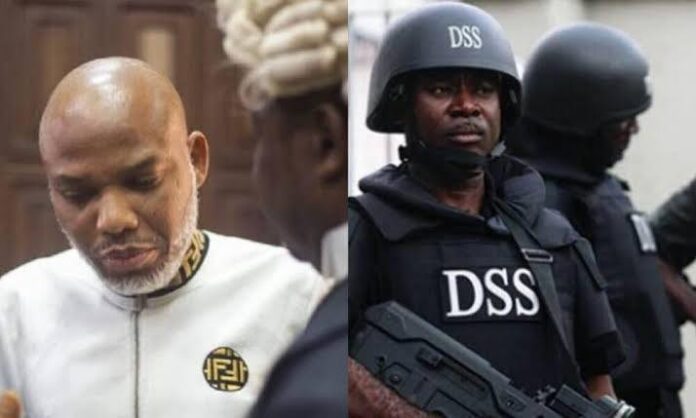By Anthony Ochela, Abuja
The Department of State Services (DSS) on Wednesday distanced itself from the controversial arrest of the leader of the proscribed Indigenous People of Biafra (IPOB), Nnamdi Kanu, in Kenya.
The submission occurred during cross-examination of a prosecution witness, identified only as BBB, an intelligence officer from the DSS.
The security agency insists its operations are limited strictly to Nigeria’s territorial borders during Wednesday’s cross examination of the prosecuting witness by Paul Erokoro (SAN), on behalf of the defense lead counsel, Chief Kanu Agabi (SAN).
Kanu is facing terrorism-related charges brought by the Federal Government.
Before commencement of the Cross examination, Agabi took the floor to distance the defence team from a string of controversial media publications attributed to them.
“We are not part of those negative reports,” he stated, drawing immediate support from lead prosecuting counsel, Chief Adegboyega Awomolo (SAN), who expressed concern over the impact of such narratives.
Awomolo revealed he had formally written to the defence regarding the issue and had wanted the court to issue a clear directive to curtail the trend.
“It is important we caution ourselves, especially those of us who are lawyers. This is a sensitive national matter, and professionalism must guide our conduct,” he said.
Justice Omotoso warned legal practitioners against sensationalism and unethical behaviour.
“Lawyers must not be involved in leaking court proceedings or confidential communication to generate traffic or sympathy,” he said.
“We must act in the interest of justice, not personal popularity. We must refrain from using the life of parties to promote traffic on our social media platforms.”
During the cross-examination, Erokoro questioned the DSS operative on several aspects of the agency’s investigation and its operational limits.
The witness, who admitted not listening to Radio Biafra directly, stated that the intelligence from other officers assigned to the role was credible.
Pressed on the legality of Kanu’s arrest in Kenya, the officer denied involvement, saying: “We are a domestic intelligence agency. We do not operate outside Nigeria. If he was arrested in Kenya, we are not responsible.”
When asked whether he investigated Kanu’s claim of being “kidnapped” and forcefully returned to Nigeria, the witness said it was not part of his brief.
The defence also referenced various judicial pronouncements declaring Kanu’s detention and invasion of his Abia home illegal.
Erokoro successfully tendered certified copies of judgments from courts in Abia, Umuahia, and Enugu, with no objections from the prosecution which were accordingly admitted by the court.
Erokoro further challenged the witness on whether calling for self-determination—absent violence—constitutes terrorism.
“Not all agitators are terrorists,” the witness conceded, but added that the agitation by Kanu was preaching violence.
The defence also raised concerns about perceived double standards in the handling of other regional security outfits like Amotekun and past political agitators.
On the broader issue of insecurity, the DSS officer admitted that despite Kanu being in custody, violent incidents linked to IPOB have not completely ceased but said they were reducing.
A heated exchange between both sides emerged when the defence sought to stand down the matter, citing the need to obtain a certain video evidence for presentation.
Awomolo objected, accusing the defence of employing delay tactics.
Justice Omotoso, however, allowed the application “in the interest of justice” and fixed May 22 for continuation and conclusion of the cross-examination—warning that the defence must close its case or risk having it deemed closed.





